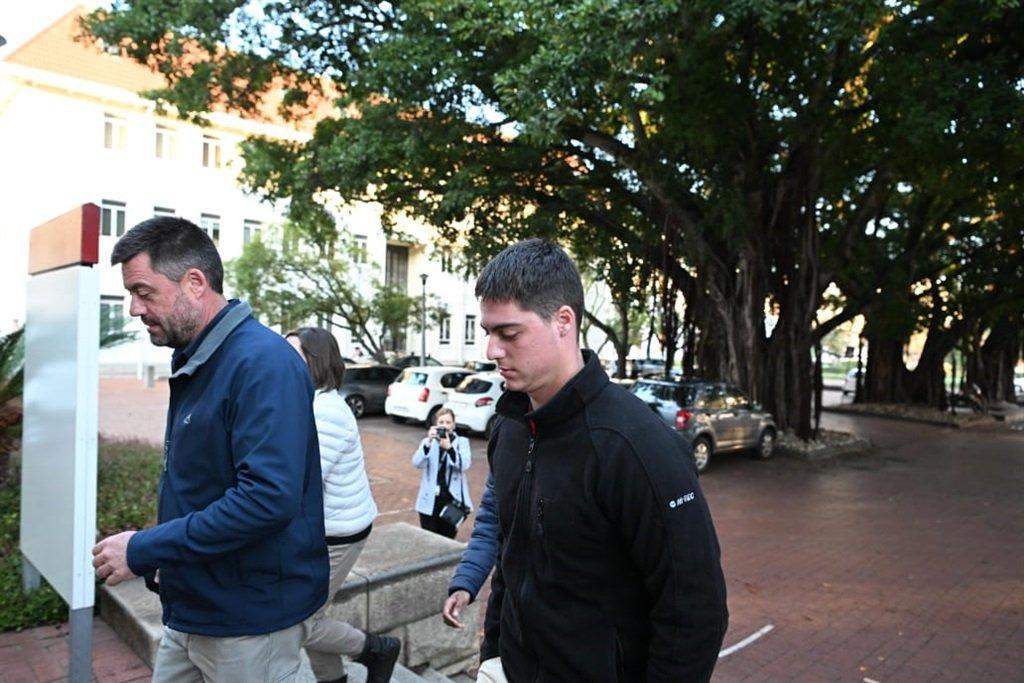Africa-Press – South-Africa. Stellenbosch University’s (SU) central disciplinary committee (CDC) has slammed Huis Marais residence for poor leadership and for excessive drinking at the residence after student Theuns du Toit could not recall urinating on Babalo Ndwayana’s personal belongings because he drank excessively to “fit in”.
The CDC rejected Du Toit’s extreme intoxication claim as an excuse, said he wilfully drank excessively and appeared to have no control over his bodily functions when he was filmed urinating on Ndwayana’s desk.
Although it could not conclude that Du Toit’s use of the word “boy” was racist, it damningly found that the utterance of “it’s a white boy thing” could only be deemed racist.
The CDC found:
“Ultimately, on the facts and evidence presented, SU has failed to prove, on a preponderance, that the use of the term ‘boy’ was racist or racially motivated,” the CDC report read.
But the statement “it’s a white boy thing”, which Du Toit said he was too drunk to remember saying, had a clear interpretation.
The committee said Du Toit’s lawyer offered testimony from Du Toit’s friends to prove that he was not racist, but this did not help him.
It said:
“Racism can be an individual act. Furthermore, having friends of colour does not exonerate an individual from being racist – it is absolutely possible to have friends of multiple races, but still act in a racist manner one or more times. Accordingly, we fail to be convinced of the importance of these testimonies in determining what was said.”
The CDC said Ndwayana’s statements before the media descended on him were “clear and consistent in the immediate aftermath of the incident”. There may have been some variations in public statements as the week wore on, but on the balance of probabilities, the CDC believed him.
The committee also issued a strong statement about Huis Marais’ alcohol policy management.
“The accused confessed during the hearing to having consumed half a bottle worth of brandy while in Huis Marais,” the committee said.
Stellenbosch University urine saga: Ndwayana content with ruling, Du Toit family to appeal expulsion
“The accused and Mr Y left the residence at around 10pm and visited two establishments over the course of the night. The accused confirmed that he consumed eight double brandy and mix drinks (totalling a minimum of 16 shots – close to one bottle worth). In total, the accused consumed around one and a half bottles worth of brandy between 7/8pm on the 14th of May and 2/3am on the 15th of May.”
Du Toit and his peers were so intoxicated on the night he entered Ndwayana’s room, that he claimed he could not remember the incident.
The CDC said this appeared to have been regarded as normal.
It said that at first, there was no urgency or official assistance to Ndwayana, which highlights Huis Marais’ failure of leadership.
“Mr Du Toit has been scapegoated, thereby conveniently ignoring the culture which has been bred in Huis Marais and, by extension, SU. In his own words, Mr Du Toit attested to being a part of a drinking culture at SU and relying on alcohol to ‘fit in’,” the CDC judgment read.
The university announced the decision to expel Du Toit on Thursday evening, after the disciplinary hearing was finalised.
In a statement, university spokesperson Martin Viljoen said Du Toit was found guilty of contravening SU’s disciplinary code for students and its amended residence rules.
The CDC also said it deemed it necessary to include criticism of SU and Huis Marais in the judgment.
“As we have found, Mr Du Toit was not guilty of causing the consequent disruption of order and discipline at SU, as other factors and incidents also played a role. However, we wished to address the failure in leadership and the culture of Huis Marais,” it added.
The CDC found that “painfully; the matter took just shy of 10 hours before it was reported to a member of staff – Dr Groenewald.”
“The video of the incident, which the Huis Marais Prim had, was only delivered to Dr Groenewald at 16:02 – eleven and a half hours after the incident. Why it took the student leadership of Huis Marais so long to report this incident correctly, we can only speculate. And in light of the evidence produced by Dr Groenewald in the hearing, this CDC is inclined to speculate that the delay is undoubtedly linked to the residence’s culture of secrecy and poor leadership,” it said.
ALSO READ |
Stellenbosch urine incident: Victim’s family hopes for expulsion of perpetrator as hearing begins
The panel added that the Huis Marais student leaders’ failure to act immediately, speaks to the gravest failure of what it means to be a leader.
The panel commented at length about Huis Marais’ reputation at the university.
“It is no secret to SU that Huis Marais breeds an unwanted culture. As was noted, SU has attempted to change the culture of the residence. This attempt took the form of not accepting newcomers in 2020 and 2021. This decision was communicated by Dr Choice Makhetha (Senior Director: Student Affairs) following a large number of incidents involving Huis Marais members,” it said.
The panel recommended that the judgment be sent to former Justice Sisi Khampepe as a submission to the Independent Commission of Inquiry.
In particular, it is strongly recommended that the attempt to transform Huis Marais be re-evaluated through the inquiry.
For More News And Analysis About South-Africa Follow Africa-Press






